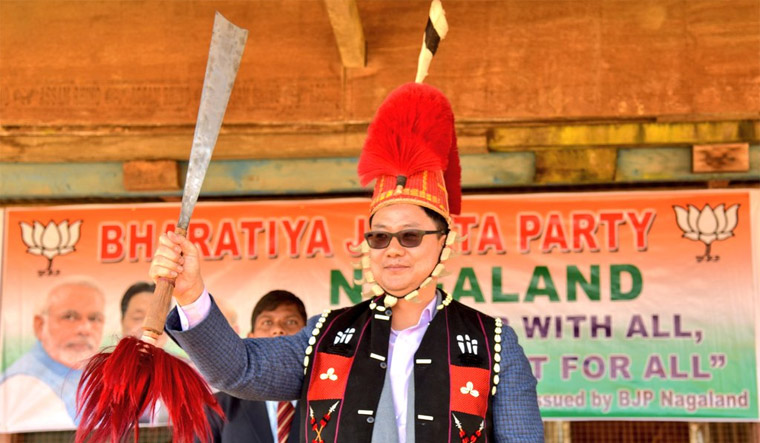The high-stakes electoral battle in Nagaland has seen many twists and turns. From a call to boycott the polls before a solution to the vexed Naga insurgency issue to the church issuing a diktat not to ‘pierce the heart of Jesus’ by voting the BJP to power, the state saw it all.
However, amid incidents of violence, believed to be a result of the tough fight between the two main rivals—the ruling Naga People’s Front (NPF) and the combine of the Nationalist Democratic Progressive Party (NDPP) and the BJP—the state saw a voter turnout of 75 per cent in 59 of the 60 constituencies. Counting of votes would be held on Saturday.
In 2013, the BJP had won one seat with 1.8 per cent vote share to the NPF’s 38 seats with 47 per cent vote share. However, this time, the equations have changed as the saffron party has terminated its alliance with the NPF, it’s ally of 15 years, to go with the newly floated NDPP of former chief minister Neiphiu Rio.
Therefore, in Nagaland, the BJP’s hope hinges on its alliance partner, the NDPP of 67-year-old Rio. The NDP had contested from 40 seats, which was reduced to 39 as Rio was elected unopposed. The saffron party has fielded candidates from the remaining 20 seats.
The Congress, which has given three chief ministers to Nagaland since the state’s inception in 1963, is nowhere in the reckoning. Largely unprepared to face the polls in Nagaland, the party is contesting only 18 seats.
The two main contenders are hopeful. But the picture is hazy as no one knows how the Nagas have voted. A hung Assembly is a possibility. The outcome, people of the state feel, would be a ‘defining moment’ for both the NPF and the NDPP-BJP combine.
Having ruled the state uninterrupted since 2003 and looking set for another term given the absence of opposition in the state since 2015, the Shurhozelie Liezietsu-led NPF is one of the oldest regional parties in Nagaland. It was earlier headed by Rio, who led the party to three consecutive victories from 2003 onwards.
Rio—who was the chief minister from 2003 to 2008 and again from 2008 to 2014—resigned from the position in 2014 to contest the Lok Sabha polls. Rio resigned as Nagaland chief minister on 24 May 2014 after winning the Lok Sabha seat from the state.
Right now, Rio has turned full circle, as he resigned as a MP on 16 February 2018. He hopes to lead the state as the chief minister once again.
A win for the NPF, which relentlessly flagged the Hindutva issue in the Christian majority state, would be the biggest blow to the BJP-NDPP combine. It is little wonder that Kiren Rijiju, the union minister of state for home and BJP’s election in-charge in Nagaland, is keeping his fingers crossed.
The ruling NPF is already under tremendous strain for three reasons—corruption charges, anti-incumbency and power tussles.
Last year, there was an intense power struggle within the NPF—first between supporters of the incumbent chief minister T.R. Zeliang and Rio and then between Liezietsu and Zeliang.
But again, a solution to the seven-decade Naga problem can only be found by the BJP government at the Centre, which had signed a framework agreement with the Nationalist Socialist Council of Nagaland (NSCN) in 2015. Modi had said at a poll rally in eastern Nagaland that he was hopeful of arriving at a deal in the next few months. A solution is what the Nagas look forward to at the earliest.
Given the clash of interests among various political actors, it is possible to say that the state could see a hung Assembly on Saturday.


